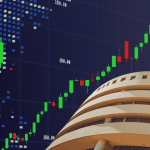On Friday, August 1, Gift Nifty is indicating yet another shaky start for the benchmark Nifty. As of 7:00 AM, the GIFT Nifty was trading near the 24,716 mark, down 52 points from its previous close.
Asian markets traded lower, mirroring an overnight decline in US stocks as investors responded to the impact of Trump tariffs and recent corporate earnings reports.
On Thursday, U.S. President Donald Trump issued a broad executive order introducing reciprocal tariffs on a range of imports from several countries. The new duties include a 35% tariff on numerous Canadian products, 50% on goods from Brazil, 25% on imports from India, 20% on items from Taiwan, and 39% on products from Switzerland.
ITC, Adani Power, The Tata Power Company, Godrej Properties, UPL, Tube Investments of India Ltd, GlaxoSmithKline Pharmaceuticals, Multi-Commodity Exchange of India, Narayana Hrudayalaya, Honeywell Automation, LIC Housing Finance and Delhivery will announce their Q1 earnings today.
On Thursday, July 31, Foreign Institutional Investors (FIIs) were net sellers, offloading equities worth ₹5,588.91 crore, marking a streak of nine consecutive trading sessions of selling. In contrast, Domestic Institutional Investors (DIIs) purchased shares worth ₹6,372.71 crore during the same session, extending their buying streak to 19 consecutive trading sessions.
Indian benchmark indices pared early losses on Thursday, rebounding from a steep intraday decline. Investors interpreted the U.S. tariff move more as a negotiation strategy than a long-term threat. The Nifty 50 ended the session 0.35% lower at 24,768.35, while the BSE Sensex slipped 0.36% to close at 81,185.58.
On Thursday, US stock markets ended lower, with the S&P 500 registering its third consecutive day of decline. The index slipped by 0.37%, closing at 6,339.39. The Nasdaq Composite was nearly flat, edging down by 0.03% to settle at 21,122.45. Meanwhile, the Dow Jones Industrial Average faced a steeper drop, falling 330.30 points, or 0.74%, to close the day at 44,130.98.
US inflation saw an uptick in June, driven in part by higher prices for imported goods due to recent tariffs. The personal consumption expenditures (PCE) price index rose by 0.3% in June, following a revised 0.2% increase in May. Earlier, May's rise was reported at 0.1%.On a year-over-year basis, the PCE index grew by 2.6% in June, compared to a 2.4% increase in May.
The number of Americans filing new applications for unemployment benefits increased marginally last week. Initial claims for state unemployment benefits rose 1,000 to a seasonally adjusted 218,000 for the week ended July 26.
Gold prices remained stable in early Asian trading as market participants monitored developments around tariff negotiations. US President Donald Trump granted Mexico a 90-day extension, though White House Press Secretary Leavitt confirmed that sector-specific tariffs on the country remain in place. Additionally, the White House stated that Trump signed an executive order increasing tariffs on Canadian goods to 35%, up from the previous 25%. Spot gold dropped 0.03% to $3,288 per ounce.
Oil prices remained largely unchanged after a 1% drop in the previous session. U.S. crude futures edged up by 0.1% to trade at $69.36 per barrel, while Brent crude saw a slight increase of 0.2%, reaching $71.84 per barrel.
The US dollar index hovered near 100 on Friday, holding at a two-month high after President Donald Trump reaffirmed a 10% baseline global tariff and imposed reciprocal duties of up to 41% on countries without trade agreements.
Disclaimer: The article is for informational purposes only and not an investment advice.


Hindalco Share Price Crashes 6% as Nifty Metal Falls 3%
3 min Read Feb 13, 2026
BSE Share Price Surges 74% in 1 Year; 5-Year Return 4500%
3 min Read Feb 13, 2026
Kilitch Drugs Bonus Shares 1:1, Q3 Results, Share Price
3 min Read Feb 13, 2026
Railway Stock in Focus: MIC Electronics Wins Railway Orders Worth ₹5.91 Crore This Week
3 min Read Feb 13, 2026
HAL Share Price in Focus After ₹2,312 Crore Contract Signed for 8 Dornier Aircraft
3 min Read Feb 13, 2026